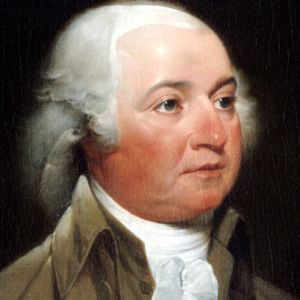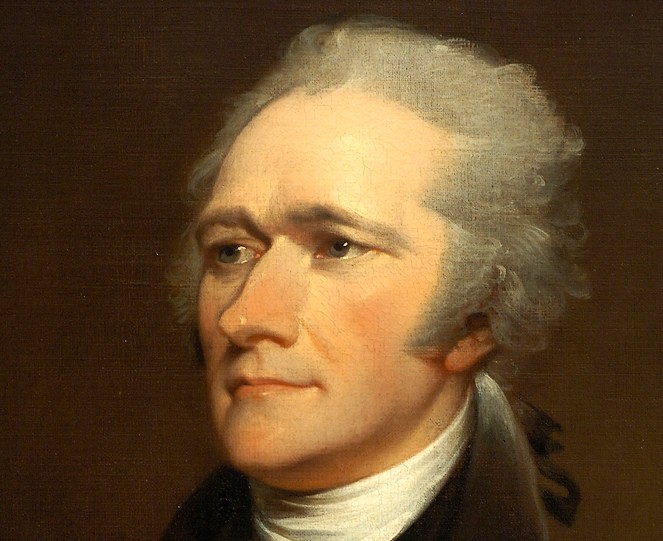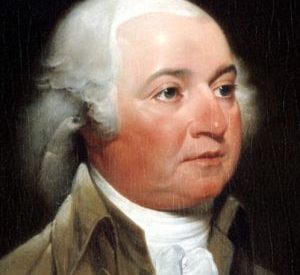 Painting by John Trumbull around 1792
Painting by John Trumbull around 1792
Note: If you are wondering at the ?creole bastard? comment, my follow-up in Arc Digital is here: https://twitter.com/thecriticaldom/status/1299821902882656258?s=20
I have been meaning to do two things through much of this summer: reread David McCullough?s John Adams, and to write on how he is depicted in the musical above. The way I will approach this is to look for each reference to Adams in the musical, report those lines, then address them. The purpose here is to argue for Adams? reputation with historical fact and reference to his rectitude, and, truth be told, regardless of how much I do enjoy the musical, which I have used for class, to lessen the hagiographical effect this production will ultimately have on the American mind for Hamilton himself. Since we lack a reading public, the average listener will simply take music at its note-value, without digging for that essential Truth of the situation.
To begin with the first mention:
?Angelica, tell my husband John Adams spends the summer with his family,? and ?Angelica, tell my wife John Adams doesn?t have a real job anyway.?
While it may be true that the position of Vice President did not have many responsibilities when it was originally created, that does not diminish the fact that he presides over the Senate, and votes only in the case of a tie, as we have seen so often in the current administration. It would be worth noting that he always voted with the wishes of Washington. The greater point that Eliza makes is that Adams is devoted to his wife, Abigail, who in her own right is an American treasure- educated, sassy, and always in need of pins. Had Hamilton heeded his wife, perhaps he would have been saved from himself.
Adams then disappears in the musical until when George III speaks of him:
?[?] who looms quite as large. John Adams? I know him, that can?t be, that?s that little guy who spoke to me, all those years ago. What was it, ?85? That poor man, they?re going to eat him alive! [?]?
He then does his little crazy bit, but of note here is the setup. Who, indeed, looms quite as large as Washington at the time? Who would the electoral college vote for to follow in his footsteps? Why, the very Vice President who was the only man who went to the Second Continental Congress knowing that separation was the only way forward, argued on the floor until it became reality, who served on tens of committees in Congress at the onset of the war, left his family behind to assist Franklin in France, return, but then was sent off again to Europe, secured vital Dutch money to finance the Revolution, and then served as the first minister to Great Britain in 1785, after being one of the negotiators for peace in 1783? But no, he only mentions Adams? height, which was around 5’8, which was considered of a middling size in those days, though in truth a few inches taller than myself. Taken altogether, its meant to set the audience against Adams by mocking him.

Continuing on, then, to the Adams Administration:
?[?] Adams fires Hamilton, privately calls him ?creole bastard? in his taunts (Say what?); Hamilton publishes his response! ?Sit down, John, you fat mother f*****.??
The first part is easy enough- Hamilton left office in 1795, during Washington?s second term. Adams came to office in 1797, which makes this false. Next, the ?creole bastard? bit. I have been looking around for where the citation for this appellation comes from, but I cannot find it. The closest I can come to hail from a couple of letters to Benjamin Rush: one from 1805, wherein ?Scottish Creole? is found, while another is in a letter in 1806, in which the phrase ?[?] bastard brat of a Scotch Pedler [?]? does find purchase. However, 1805 and 1806 are not 1797, nor is 1795. Before moving to that pamphlet and its effects on Adams, it?s worth noting that Hamilton did his best in the election of 1789 to manipulate the electoral college such that members would withhold their votes from Adams, who ended up with 34 to Washington?s 69.
Jumping forward, after being elected President of the United States, Adams made the decision to retain Washington?s cabinet. The problem was that they were Hamilton?s men, and worked throughout Adams? presidency to both undermine it and feed inside information to him. While Adams did still have pull as a Federalist, as the election of 1800 loomed, Hamilton pushed for a man by the name of Pinckney to be their candidate, but the president continued to be the leading name for the Federalists.
We come here to Hamilton?s A Letter from Alexander Hamilton, Concerning the Public Conduct and Character of John Adams, Esq., President of the United States. In the sequence of events above, the musical would have us think that the letter was a response to the firing and also the ?creole bastard? comment, the former of which is impossible, the latter of which might require getting a copy of Chernow?s book to try and confirm it. With fifty-four pages of argument against John Adams, it?s interesting that it does not actually charge the president with anything, and somehow ends with some compliments towards his probity at the end. It was quite the surprise to the Federalists, a Godsend to the Republicans, and even caused Noah Webster to publish a counter-pamphlet questioning Hamilton?s ambition.
I will now move from here to a wretched idiom of today:
?[?] John Adams shat the bed.?
Actually, never mind that. If the above has any power of persuasion at all in trying to rectify what is stated in the musical as contrasted to the reality of the late 18c. regarding these men, then I would hope that this statement can be seen as silly, particularly when regarding a man who practically handed victory in 1800 to the man he had had so many problems with. Jefferson, that is.
Taking stock, I?ve gone through the references to John Adams throughout ?Hamilton,? given additional context and information about what happened in that time in order to better balance the books between these two men, particularly because the musical works its hardest to be hagiographical towards Hamilton, with only making his lust seem his weakness. One important piece of information not addressed in the entirety of the production is that, during the Adams Administration, the president commissioned a navy to protect against French privateering, and reluctantly set up a new army, under Washington.
That man, being of great age and infirmity at the time, was more so a figurehead at the time, and he had only one demand of President Adams, and that was for Hamilton to be the Inspector General, second only to Washington himself in the army. When the nomination went through, Hamilton began setting up supply depots in the hopes of taking Spanish Florida, which would certainly have led to a conflict the United States was not prepared for. Had Adams given the order, Spain and France would naturally have attacked the United States, and it is doubtful Napoleon could be repelled. One might go further here and look into Francesco de Miranda, from Venezuela, who put forth the scheme, which would require assistance from the British. This is another place where the charge of ambition finds its mark in Hamilton, particularly because this plan was quite nuts.
Despite the criticisms here levied against the musical, it is still quite entertaining, and does tell an emotional story about one of the Founders which does need to be studied more often. Indeed, American political thought can best be understood through the Federalist Papers, and Hamilton?s duel to the death with Burr serves as the best example of why honor was important to that generation. I hope that at least one person has gone on to learn more about the Early Republic as a result, but here, defending John Adams? reputation, the musical does a poor job of adding appropriate context to their relationship as the two most prominent Federalists, which is more akin to a musical strawman than anything else.


